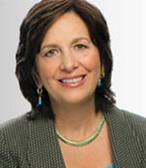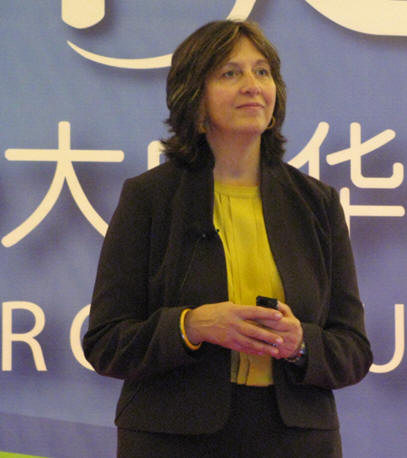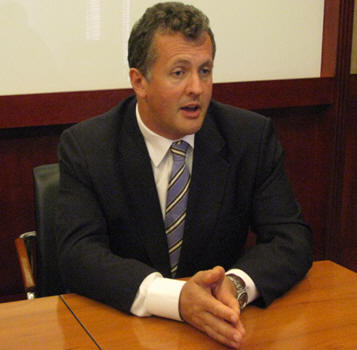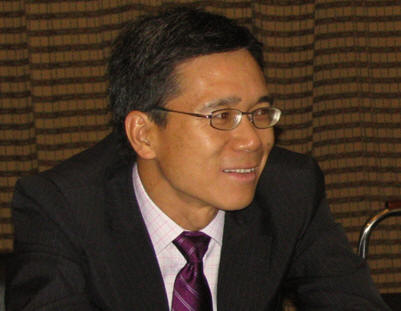Innovation with customers to be more competitive
In October 2010, I interviewed Ms. Pam Lopker, the founder and president of QAD, and Mr. Gordon Fleming, the CMO of QAD on the annual user conference of QAD. Mr. Jay Cao, the country manager of QAD China, also joined the interview.
In October 2010, I interviewed Ms. Pam Lopker, the founder and president of QAD, and Mr. Gordon Fleming, the CMO of QAD on the annual user conference of QAD. We talked about the technological innovation, business strategy of QAD, and also the growing status of QAD in China. Mr. Jay Cao, the country manager of QAD China, also joined the interview.

Ms. Pam Lopker, the founder and president of QAD
Pei Huang: I attended your global user conference in the US when you celebrated your 25th anniversary in 2005. Please summarize the progress of QAD in the last 5 years, and the vision of QAD in the next 5 years.
Pam Lopker: I think for the last 5 years, QAD has been all about perfecting the visibility, the usability, and the flexibility in global applications of the product. One of the major milestones over the last 5 years was that we rewrote our financials from ground up to be very global and best in class for manufacturing companies. The global companies want to have a single instance that runs their financials worldwide, but we have to build the localizations into the standard product until our latest release of our Enterprise Financials. It can support for a single instance of worldwide financials. We’ve been working very hard to increase the visibility from suppliers to customers and to the CFO. We did a lot of work in BI product to get information easily and be able to analyze what the customer wants. Another goal is to have a product which is configurable, and need not to be customized. We don’t want our customers to change code, because it’s difficult for them to keep upgrading with our newest version. The reports are all data driven using our reporting framework which is capable to drill down to different fields and also be configurable.
In the next 5 years, these fundamental changes will be necessary not only for our premise customers, but able to support an on demand environment, just like Yahoo or Microsoft portal. All of these fundamental changes that we have worked over the last 5 years are really the bases for our on demand products. We can provide on demand capability for our global customers with easy integration to other on demand products, whether it’s our HR product or a portal for a large customer’s tracking, receipt, shipments or demand, and integrating all these capabilities throughout the supply chain. The change of inventory and production will be automatically notified to distribution centers and the suppliers, and to change forecast demand. So, it’s going to be much more about visibility, about reacting to changes and demands. They are completely different kinds of systems than we had in the last 20 years.

Pam gave keynote speech on QAD Chinese user conference
Pei: Gordon, would you please summarize the progress of the sales, marketing and operation of QAD in the last 5 years?
Gordon Fleming: Pam shared that we focused on making significant enhancement to our product. I think those changes of usability, the birth of on demand deployment of our ERP and the access to data put us on very strong position on the market. Our organization has two key concentrations today. First is to focus with our existing customers on deep engagement to understand the challenges they have in their business and help them to embrace the development that we have been making in our product to address their challenges. So, we are putting more effort on training and hiring more people to really help our customers with business transformation and business process issues. QAD is no longer just a company selling great software, but we are a partner of our customers to help them achieve their business outcomes. Second concentration is new companies who are perhaps in the emerging market starting up for the first time or maybe the off shores companies which are in the position of our on demand offering. To really do something that customer need, we deliver with QAD Enterprise Application on demand, which could offer all capabilities that global companies need and all functionalities for special manufacturing industries like life science, in a method without anymore difficulties to infrastructure. Our channels help to take those products to new markets and new customers. Our sales forces are far more focusing on really consultative engagement with our customers.
Pei: When we talk about on demand business, customers often care a lot about their specialized requirements. How could QAD on demand software meet their unique requirements?
Pam: We find that 80%-90% of customization that our customers do are around reporting. So, now we really expand our reporting capability. Our on demand software can be configured very easily and customers can add more fields and even add new screens and new files, but doesn’t interfere with the upgrade ability with the systems. So, that has been a huge great breakthrough.
Pei: Please share your view about the trend of management software applications of global manufacturing.
Pam: The key trend for manufacturing is to have smaller and smaller laws and more and more configurable. So we can make changes on more rapid bases and be able to react more quickly to meet the demand of customers. As a software provider for manufacturers, we need to allow customers change what they are going to make, probably not continuously but at least on ship by ship bases. From demand management to visualization of margins, sales and inventory level, they can quickly make decisions.
Pei: Many Chinese manufacturers have several independent application systems without seamless integration. What’s your suggestion to realize integration?
Pam: Integration is one of the big frontiers that still need to be solved. It’s always difficult although much software has put API and integration capabilities into the software. For instance, if one system allows customer use 10 digits and another system only allows 6 digits, those become very difficult to integrate. But I think it’s getting easier and easier over time, because systems do have a good API and good integration points. But the hurdle of integration is the difference of data coding system, but I think over time that will change, because the item numbers are starting to be standardized and commodity codes are being standardized. So, that’s the last frontier in providing seamless integration.
Gordon: Though we still need to build some specialized integration for our customers, we have built integration with our core system and other ERP system by our connectors. We want to make it as easy as buying applications from Apples App store to get integration to approach that maybe on premise or could be SAAS product. So, we’ve been building up a portfolio of connectors to integrate with other application systems.
Pei: What’s your view about the global manufacturing management software market?
Gordon: Over the last 10 years, we’ve been seeing much consolidation on ERP market. We’ve done from a market with perhaps 200 vendors in year 2000 to today, with 12 companies worldwide that we think important for us to watch, because there are some players who follow the growth strategy of acquiring other ERP to improve market share. But we think it’s a short term strategy that’s not in the best interest of customers. Some players have a diverse approach to find the market they address, so they can expand and build more and more capabilities to make their offerings to address more and more markets like oil and gas, government and educations. The challenge of that approach is that it’s difficult to deliver the specialized capabilities to customers’ needs, because they don’t have the specialization. But for QAD, the strategy we always follow since we set up our business 30 years ago is the pure focus on manufacturing. We believe it has been the best focus for our customers. We have no intent to acquire other ERP companies. We just do some acquisitions of technology and components if we think it’s going to give our customers advantages. The market is likely to have more consolidation. We will continue to deliver excellent solutions and much high value to our customers and also maintain our focus.

Mr. Gordon Fleming, the CMO of QAD
Pei: Mr. Cao, what’s your view about the market status of management software in China?
Jay Cao: I think it has a great prospect in China. It can be used in all types of enterprises. Though there are some larger companies may deploy some management software, there are still many Chinese enterprises have not used it yet. I think in China, the fast growing companies, the new companies and the smaller companies, they all will need management software to support their growth in the future. It just need some time.

Mr. Jay Cao, the country manager of QAD China
Pei: As a global IT vendor, how could your software meet the needs of manufacturers from different countries with different culture?
Pam: More and more manufacturers are becoming global. In fact, 70% of our customers have facilities in more and more countries. When I look at culture differences, China is very close to the U.S., because they are fast moving, they are adapted, and they can make things happen. Other cultures like France have a lot of rules, and Japan has a very exacting culture. We have to adapt to those different cultures. So, these are the opportunities and challenges of being a global software provider. And you have to work with all different cultures and do the best you can.
Gordon: 70% of our revenue comes from the customers who are global manufacturers. The borders are dropping down. If there is something has value, the culture trends move faster across their board as never before.
Pei: In China, there are many fast growing manufacturing enterprises. What’s your suggestion for them to fully utilize the power of IT and especially management software to improve their performance?
Pam: IT has to partner very closely with operations. So the finance, manufacturing and logistics can anticipate all requirements and react to requirements.
Gordon: When I look at our philosophy, IT is the foundation to support the growth. So I would encourage the fast growing companies to invest time to identify the business processes to deploy the solutions, and make sure if they pick the vendors who can grow with them with scalable solution. That’s something we are proud today. We started with QAD enterprise applications with 5 users, but today we have 5000 customers. So, it’s important to choose a scalable ERP solution. As Pam said, it’s now easier to do that than ever before with on-demand deployment of ERP.
Pei: With over 30 years of history, how could QAD keep the business stable and profitable?
Pam: The key reason is being able to forecast correctly. Being able to have good forecasting and demand management allows?us to anticipate customers’ demand and develop our solution accordingly. So, we are very proud years and years of positive cash flow and profit.
Pei: What’s the strategy of QAD to get sustainable growth with the global economy recover from the recession, and with the fierce competition of other larger software vendors?
Gordon: Our growth is coming with our customers in our target market places. So, we focus on looking at where manufacturing customers need to deploy to service their global businesses, and make sure we deliver the right solutions, capabilities and services to do that. Not only do we understand the requirements of global manufacturers, but also the local nature of business. Our challenge is to put the resources in the right place so that we can optimize the resources of our customers and maximize our growth.
Jay: I think the know-how and best practices what we’ve built for these years in manufacturing have put us in a strong place in the market. So, in China, we will focus on the vertical industries of QAD, such as auto parts, electronics and mechanical equipment industry. On the other hand, we will find the markets with big opportunities in China. We see that the life science, especially medical devices industry has great potential in China. So, we will focus on those markets to get fast growth. Besides, we will keep an eye on Chinese local enterprises. Because when these enterprises become big and global, they have to figure out which solution is the best choice for them. Then it’s the chance of QAD in China.
Pei: What’s the kernel of the corporate culture of QAD?
Pam: I think that the culture of QAD is working with our customers. Some companies care more about the technology, and other companies always want to be bigger and stronger. But I think our culture is customer first.
Gordon: We have very open culture and we are transparent in our dealings both internal and with our customers. When we have customers visiting in QAD, they always feel like visiting a family and tell about what’s going on since last meet. Our culture is absolutely focuses on our customers. Everyone in QAD has passion to achieve the best outcomes for our customers.
Jay: I want to give a simple example. As the country manager of QAD China, I can access to all the executives in QAD and ask for help. And each of them will willing and be very helpful to help our business. This is very different from a lot of companies I have worked for. People can’t talk to somebody without the permission of his boss.
Pei: Pam, do you still spend most of the time on technology or R&D?
Pam: I do a lot of software projects with years. But for the last a few years my R&D passion has been around usability. So I spend a lot of time with the user interface group to solve reviewing direction.
Pei: How could you keep the balance of work and family?
Pam: Our children have left house. They are in college now. So, I think they give us more opportunities to work. But in the last year, I developed a new passion for organic gardening. Now I have to spend at least a day of weekends in the garden. It’s very fulfilling to grow something from the ground. I’m trying to get the watering management pretty well. So, I’m installing a water sensor which can control the water. I think that would be the automatic system for watering.
Pei: There is a hot topic in China about green manufacturing and green design. What’s your view about green manufacturing and how could QAD help the manufacturers to be more “green”?
Gordon: As we moved into the 21 century, traceability, quality and environment are becoming prevalent and extremely important to manufacturers. To help manufacturers, we can give them materials to be able to trace attributes and maintain the traceability of products. We point ourselves on being environment friendly. We have done more and more working with our customers with initiative to help them have visualization of their supply chain to get better traceability and better report.
Pei: As a successful woman entrepreneur, Pam, would you please summarize the key success factors of your professional career?
Pam: Looking at my 30 years career, I think the successful things always have to do is relationships. There are relationships with customers, partners, and co-workers in QAD. By developing successful relationships, you can develop successful long term customers, sustainable growth and continuous business. So, all has to do is creating and maintaining good relationships.
Editor: Sophie Shi sophie244@msn.com
For the video of the interview, please visit: http://video.e-works.net.cn/VideoPage/2011/VideoInfo619.htm
For the Chinese version, please visit: http://www.e-works.net.cn/interview/leader_319.htm








